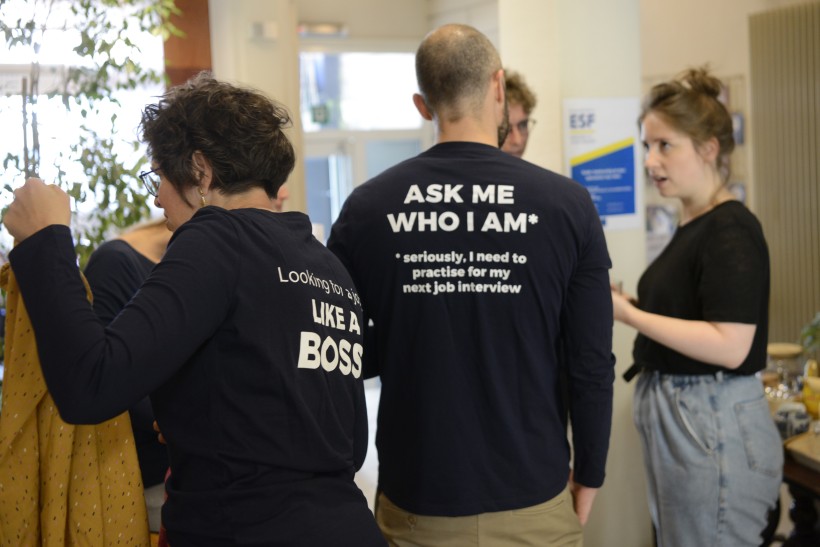You just moved to Flanders? Welcome! But now what? Like most newcomers, you’re probably eager to get to work, make a living, find stability. Belgium is a complicated country (yes, we are aware of it 🥲) and a little guidance goes a long way. In today’s blogpost, Padma shares what she learned through her Flemish journey so far so you don’t have to figure it out by yourself.
I recently relocated from India to Belgium, leaving behind a comfortable social network, a well-paying corporate career, an established way of life, and my family and friends. It is already a big deal to change cities; moving to a new country without work takes that stress and multiplies it. Finding work in a foreign nation while becoming accustomed to the new surroundings, such as the language barrier, cultural differences, and navigating through government procedures, can be really challenging.
While there’s a lot to be said about the best methods for finding work, I’ve found the hardest part to figure out was how to even be eligible to apply for a job. In this blog, I’ll tell you my tale and provide information that will allow you to apply for jobs.
What documents do I need to have before I start applying for a job?
If you belong to a non-EU country as I do, you will need two things before you can even apply for a job in Belgium: a residence permit and a bank account. However, you must rent an apartment before applying for a residence permit. While there are some excellent websites to browse, such as zimmo and immoweb, you can also contact a real estate agent to finalize one. I was surprised to learn that the tenant incurs no costs when finalizing an apartment through a real estate agent — back home, we are expected to pay at least one month’s rent as fees.
Although applying for a residence permit is simple, it may take up to three months to receive one. I was fortunate enough to receive mine in a month. While the stadgent website has all the instructions for applying for a residence permit, it could be too much to handle to read through all the numerous pages and put everything together. Before submitting my application for residence, it took me a few days to fully comprehend the procedure.
The whole process can be broken down into four steps.
Step 1: Use this link to schedule an appointment at the commune near your home.
Step 2: Visit the commune on the day of the appointment and submit your documents.
Step 3: Within three weeks, a police officer will come to your home to confirm your information. After that, you will be called to the commune to submit the fees (25 Euros) for the residence permit. In the interim, Annexure 15 will be issued that can be used for opening a bank account or for your insurance.
Step 4: In a few weeks, pick up your residence permit.
Compared to opening a bank account back home, where I had to make many trips to the branch and provide a ton of paperwork, I found opening a bank account in Belgium to be rather straightforward. You can initiate an application to open a bank account with one of the well-known Belgian banks (KBC, BNP Paribas, ING, Belfius, Argenta…) online or in person. An ID (residence permit) and documentation of your residence in Belgium are required. If you don’t yet have a residence permit, you can open a bank account using Annexure 15 and apply for one within three months of doing so. One expert tip — do take a prior appointment to save time.
Transportation System
First things first, one needs to sort out the commute to move around the city. Ghent has an excellent transportation system with easy accessibility across the city through trams and buses plying at regular intervals. Like the whole of Belgium, Ghent is also a bicycle-friendly city, and you can rent or buy a bicycle to move around the city.
De Lijn is the company that operates most of the local public transport in Flanders (buses and trams).
When I first moved to Ghent in April 2022, I was under the impression that I should first get a residence permit to be able to do anything in this city — even get a tram or bus pass. Taking individual tickets to travel around was getting heavier on my pocket. When I checked the Delijn website, I got to know that one’s passport can be used to get the pass. I went to the Lijnwinkel at Sint Pieters the same day and got myself a yearly travel card within a few minutes. Multiple options are available for the pass, and you can check them out here. The pass can be bought online here or you can visit a Lijnwinkel in person to buy one. Check out your nearest Lijnwinkel here.

Applying for Jobs
With all the documents in hand, the next big question when applying for a job was: where to begin? Is LinkedIn sufficient? What other options do I have for finding work? I found it extremely difficult to look for an English-speaking job due to my inability to understand either Dutch or French (the two most commonly spoken languages). Adding to my woes is the career change in the field of UX writing that I’m attempting, a job search with sponsorship (wherein the company sponsors my work visa, as my current visa status restricts me from working in Belgium), and my lack of knowledge of the local job market and HR strategies. Luckily, my fellow blogger Zhanna wrote 6 ways to optimise your job search as a newcomer in Flanders and The Complete Job Search toolkit, which really helped me understand the Belgian job market.
A few things that are helping me prepare for the job market are setting my LinkedIn profile to open for job alerts, and creating a few job alerts on Indeed and Talent to focus on English-speaking jobs. Next, I connected with a mentor on adplist to help evaluate my CV and provide me with tips to prepare myself for the interviews. Additionally, I also enrolled myself on meetup to engage with local groups in my field of interest and networking.
While the search for a job is still on, I came across Co-Searching, a volunteer organisation that helps people like me to find a job in Flanders, and decided to become a volunteer. Volunteering with Co-Searching is flexible and helps me connect with others like me, and learn about their experiences while trying to realise my professional goal.



